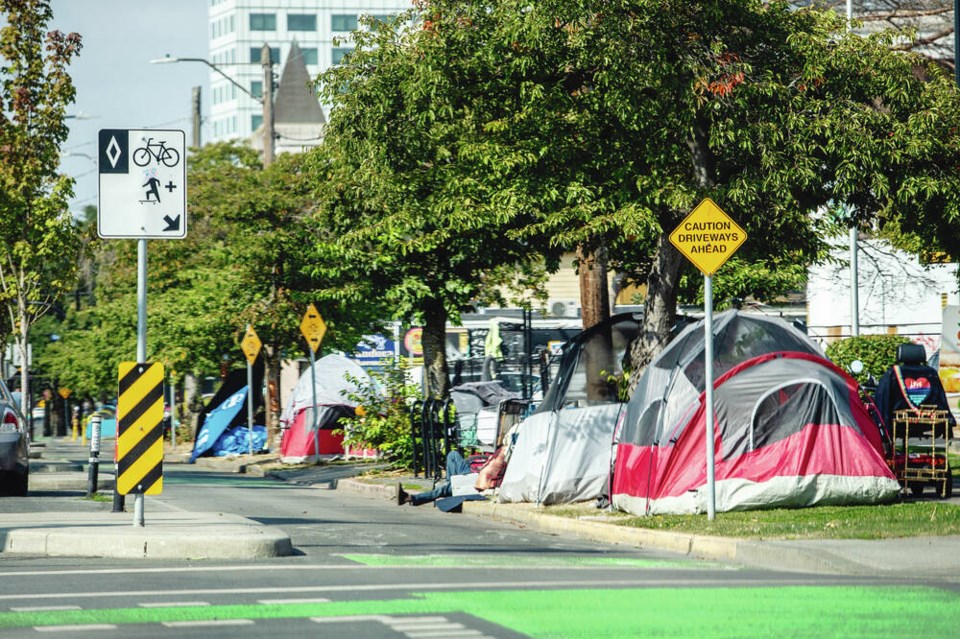A commentary on behalf of the B.C. Urban Mayors’ Caucus. Colin Basran is mayor of Kelowna and Lisa Helps is mayor of Victoria.
In April this year, the B.C. Urban Mayors’ Caucus (BCUMC) wrote to then-minister David Eby about the challenges our communities are facing with respect to repeat offenders.
We noted that many of the people cycling through the justice system were falling through the cracks, not getting the health or housing supports many of them so obviously need. And offender accountability was not being achieved. This was having a negative impact on feelings of safety in our communities. We wanted action.
Together in May, the province and the BCUMC announced an investigation into the issue of repeat offending, to be delivered in record time. The resulting LePard-Butler report, A Rapid Investigation into Repeat Offending and Random Stranger Violence, was released in mid-September with 28 meaningful tangible actions that, if funded and implemented by the provincial government, will make life better and safer for everyone in urban British Columbia.
Lepard and Butler cite the COVID-19 pandemic as partially responsible for the situation we’re seeing on our streets. They note that “the pandemic has worsened mental health and contributed to loneliness, substance use, suicide, disruptions in care and financial difficulties. Importantly, the pandemic has disproportionately impacted those who are underserved, marginalized, and already living with the fewest resources.”
They go on to say, “The number of people receiving custodial sentences declined drastically during the pandemic, from 15,284 admissions in 2019 to 9,165 in 2021. While the overall numbers have decreased, B.C. Corrections and Correctional Health Services staff have seen an increase in the complexity of mental health issues among people admitted to custody.”
This confirms that there are many more people on our streets that would otherwise be in custody, many of whom need alternative care for mental health and/or substance use issues.
Understanding the systemic nature of the challenge is key to taking meaningful action to address it. Calls that some of our members are hearing on the campaign trail to “Lock more people up!” or “Hold them for longer!” are simple fixes.
We call on the province to take swift and meaningful action to address the roots of the problem to get people the help they need and to increase safety in our communities.
To their credit, on the day the recommendations were released, the province didn’t say they “needed time to review the recommendations,” or that they would “thoughtfully consider them.”
Instead, they announced immediate action on four key recommendations. As the government develops its 2023 budget this fall, it is essential to all of our communities that the remaining recommendations are a top priority and that there is significant funding for implementation.
We appreciate the spirit of partnership the province has taken with the BCUMC to address this issue and we look forward to staying involved and engaged post municipal election.
But community safety isn’t the only issue our members are hearing about on the campaign trail. And it’s not the only issue that the BCUMC, which represents 55 per cent of B.C.’s population, can provide advice and insight to the province on, and can work in partnership.
As our Blueprint for B.C.’s Urban Future outlines, many residents in our communities face stress and uncertainty with regard to housing affordability.
Young families struggle to afford to buy homes. Seniors living in market rental units have pensions that can’t keep pace with rent increases. Low-wage workers are forced to commute long distances to access their jobs in our cities, severely affecting their quality of life. Too many of our vulnerable neighbours are looking for a path out of homelessness, including an over-representation of Indigenous people living on our streets.
Addressing housing and homelessness after the municipal election is going to require the same spirit of partnership that the BCUMC has pursued with the provincial government on complex care housing in 2021 and repeat offenders this year.
We understand the province is planning to adopt legislation this fall to help address housing supply in British Columbia. Our request is that this rolls out in a collaborative spirit with local governments.
The only way to truly address all of these issues, which are so important to our residents and business owners, is by doing so together.



